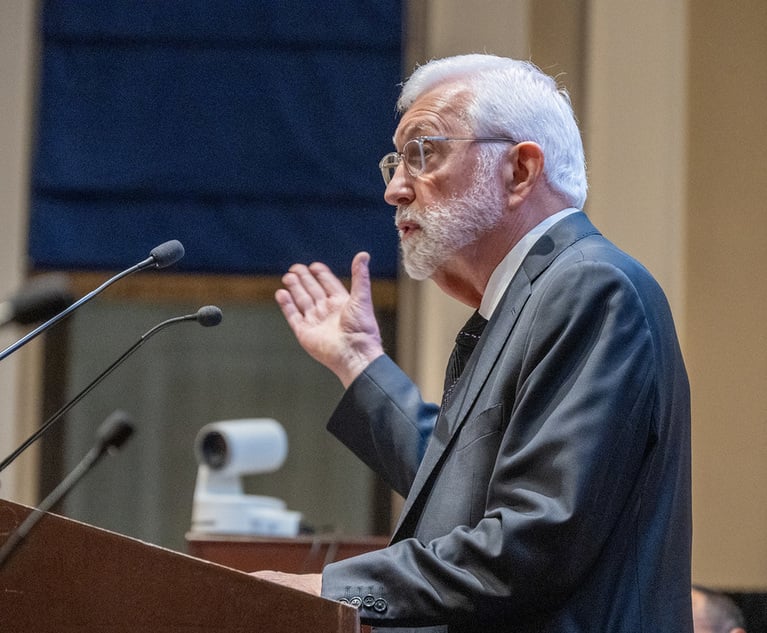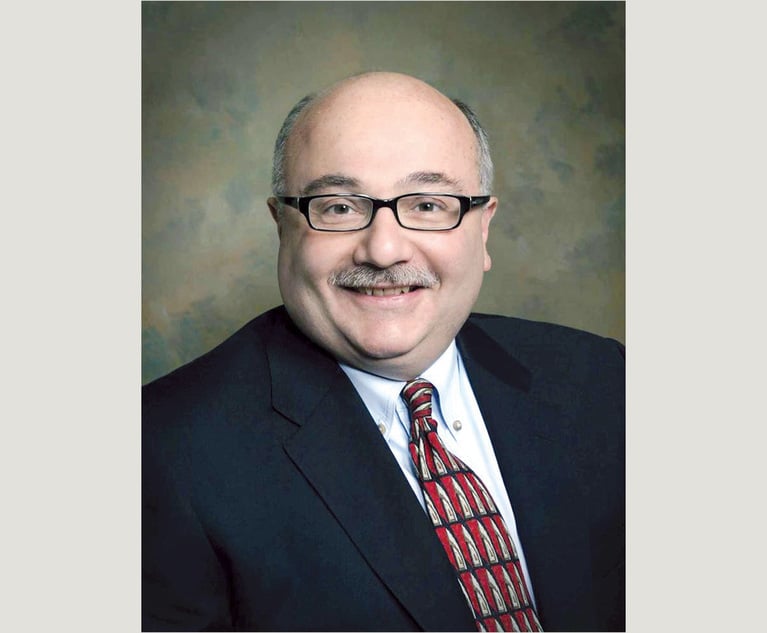Discrimination Claim Based on Gender Stereotypes Is Revived
A federal appeals panel on Monday recognized that a man who claimed he was subjected to workplace discrimination because he didn't conform…
March 27, 2017 at 05:13 PM
5 minute read
A federal appeals panel on Monday recognized that a man who claimed he was subjected to workplace discrimination because he didn't conform to gender stereotypes can sue under Title VII of the Civil Rights Act of 1964.
The U.S. Court of Appeals for the Second Circuit reinstated the dismissed Title VII claim of Matthew Christiansen, an openly gay man who said he was subjected to ridicule and abuse by a supervisor in his job as a creative director at DDB Worldwide Communications Group.
The court held that Christiansen adequately pleaded that he had been discriminated against “because of … sex” within the meaning of Title VII.
However, Judges Robert Katzmann, Debra Ann Livingston and Eastern District Judge Margo Brodie declined the invitation to break new ground and hold Christiansen had stated a claim for workplace discrimination based on his sexual orientation—saying they lacked the authority to overrule case law established in Simonton v. Runyon , 232 F.3d 33 (2d Cir. 2000) and Dawson v. Bumble & Bumble , 398 F.3d 211 (2d Cir. 2005).
But Katzmann penned a concurrence, joined in by Brodie, saying that the time had come to recognize that discrimination based on sexual orientation can be actionable under Title VII.
Southern District Judge Katherine Polk Faillahad dismissed Christiansen's suit after finding those cases required holding that sexual orientation discrimination does not come under Title VII's definition of discrimination “because of … sex.”
Failla noted there were several allegations that Christiansen's supervisor, Joe Cianciotto, was ridiculing him for effeminacy in comments and drawings. But she found Christiansen's complaint centered on discrimination for being gay, not because he failed to conform to a masculine stereotype.
Because Cianciotto also made remarks connecting effeminacy, sexual orientation and HIV status, Christiansen, who is HIV-positive, also brought a claim under the Americans with Disabilities Act, but that was dismissed as well.
The closely watched appeal in Christiansen v. Omnicom Group, 16-748, saw spirited oral arguments in January (NYLJ, Jan. 20).
Christiansen's appeal included support from the U.S. Equal Employment Opportunity Commission (EEOC), which in 2015 changed its opinion and began arguing it was time to recognize sexual orientation discrimination under Title VII.
The EEOC's view is among those currently being weighed by the U.S. Court of Appeals for the Seventh Circuit, which sat en banc in November after vacating a panel's refusal to recognize sexual orientation in Hively v. Ivy Tech Community College , 830 F.3d 698 (2016).
Included among the amici in Christiansen were 128 members of Congress who urged the Second Circuit to reverse course.
The circuit, by per curiam opinion, reinstated the claim based on gender stereotyping under the U.S. Supreme Court's decision in Price Waterhouse v. Hopkins , 490 U.S. 228 (1989), where a female senior manager described as “macho” and “masculine” was told to act, talk, walk and dress more femininely if she wanted to improve her chances for advancement.
Christiansen, the circuit said, alleged Cianciotto described him as “effeminate” to others in the office, “and depicted him in tights and a low-cut shirt 'prancing around'” and “alleges that the 'Muscle Beach Party' party poster, depicting Christiansen's head attached to a bikini-clad female body lying on the ground with her legs in the air, was seen by at least one co-worker as portraying Christiansen 'as a submissive sissy.'”
This was enough to state a claim, the court said, as Simonton and Dawson “merely hold that being gay, lesbian or bisexual, standing alone, does not constitute nonconformity with a gender stereotype that can give rise to a cognizable gender stereotyping claim.”
Katzmann's concurrence outlined how sexual orientation discrimination logically comes within the rubric of Title VII.
“When the appropriate occasion presents itself, it would make sense for the court to revisit the central legal issue confronted in Simonton and Dawson, especially in light of the changing legal landscape that has taken shape in the nearly two decades since Simonton [was] issued,” he said.
“First, sexual orientation discrimination is sex discrimination for the simple reason that such discrimination treats otherwise similarly situated people differently solely because of their sex,” he said, and he would adopt an “associational theory” of sex discrimination.
“I conclude that if gay, lesbian or bisexual plaintiffs can show that they would not have been discriminated against but for the sex of their associates, they have made out a cognizable sex discrimination claim,” he said.
“Finally, sexual orientation discrimination is discrimination 'because of … sex' because such discrimination is inherently rooted in gender stereotypes,” Katzmann concluded.
Susan Chana Lask, who argued for Christiansen, said the decision “gets us our day in court” on the gender stereotyping, and that Katzmann's concurrence “lays the groundwork for the Seventh Circuit to come out with their decision next in Hively.”
“We're very optimistic they will reverse” in Hively, she said.
Rick Ostrove, a partner at Leeds Brown Law, argued for Cianciotto.
“It's time for Congress to act and pass a statute that bans sexual orientation discrimination in the workplace,” Ostrove said Monday. “But as to this case, my client is looking forward to having it decided on the merits because we're confident we will be successful.”
Howard Rubin, a partner at Davis & Gilbert, argued for all defendants but Cianciotto. He declined to comment.
Contact Mark Hamblett at [email protected]. On Twitter: @Mark_Hamblett
NOT FOR REPRINT
© 2024 ALM Global, LLC, All Rights Reserved. Request academic re-use from www.copyright.com. All other uses, submit a request to [email protected]. For more information visit Asset & Logo Licensing.
You Might Like
View All

Decision of the Day: Second Amendment Does Not Offer Right to Obtain Firearms 'On Demand'

Decision of the Day: Firm, Founding Partner Disqualified From Probate Case Amid Investigation on Undue Influence Claim

Decision of the Day: District Judge Vacates Magistrate's Ruling to Disqualify Prosecutors in Kidnapping Case
Trending Stories
- 1Call for Nominations: Elite Trial Lawyers 2025
- 2Senate Judiciary Dems Release Report on Supreme Court Ethics
- 3Senate Confirms Last 2 of Biden's California Judicial Nominees
- 4Morrison & Foerster Doles Out Year-End and Special Bonuses, Raises Base Compensation for Associates
- 5Tom Girardi to Surrender to Federal Authorities on Jan. 7
Who Got The Work
Michael G. Bongiorno, Andrew Scott Dulberg and Elizabeth E. Driscoll from Wilmer Cutler Pickering Hale and Dorr have stepped in to represent Symbotic Inc., an A.I.-enabled technology platform that focuses on increasing supply chain efficiency, and other defendants in a pending shareholder derivative lawsuit. The case, filed Oct. 2 in Massachusetts District Court by the Brown Law Firm on behalf of Stephen Austen, accuses certain officers and directors of misleading investors in regard to Symbotic's potential for margin growth by failing to disclose that the company was not equipped to timely deploy its systems or manage expenses through project delays. The case, assigned to U.S. District Judge Nathaniel M. Gorton, is 1:24-cv-12522, Austen v. Cohen et al.
Who Got The Work
Edmund Polubinski and Marie Killmond of Davis Polk & Wardwell have entered appearances for data platform software development company MongoDB and other defendants in a pending shareholder derivative lawsuit. The action, filed Oct. 7 in New York Southern District Court by the Brown Law Firm, accuses the company's directors and/or officers of falsely expressing confidence in the company’s restructuring of its sales incentive plan and downplaying the severity of decreases in its upfront commitments. The case is 1:24-cv-07594, Roy v. Ittycheria et al.
Who Got The Work
Amy O. Bruchs and Kurt F. Ellison of Michael Best & Friedrich have entered appearances for Epic Systems Corp. in a pending employment discrimination lawsuit. The suit was filed Sept. 7 in Wisconsin Western District Court by Levine Eisberner LLC and Siri & Glimstad on behalf of a project manager who claims that he was wrongfully terminated after applying for a religious exemption to the defendant's COVID-19 vaccine mandate. The case, assigned to U.S. Magistrate Judge Anita Marie Boor, is 3:24-cv-00630, Secker, Nathan v. Epic Systems Corporation.
Who Got The Work
David X. Sullivan, Thomas J. Finn and Gregory A. Hall from McCarter & English have entered appearances for Sunrun Installation Services in a pending civil rights lawsuit. The complaint was filed Sept. 4 in Connecticut District Court by attorney Robert M. Berke on behalf of former employee George Edward Steins, who was arrested and charged with employing an unregistered home improvement salesperson. The complaint alleges that had Sunrun informed the Connecticut Department of Consumer Protection that the plaintiff's employment had ended in 2017 and that he no longer held Sunrun's home improvement contractor license, he would not have been hit with charges, which were dismissed in May 2024. The case, assigned to U.S. District Judge Jeffrey A. Meyer, is 3:24-cv-01423, Steins v. Sunrun, Inc. et al.
Who Got The Work
Greenberg Traurig shareholder Joshua L. Raskin has entered an appearance for boohoo.com UK Ltd. in a pending patent infringement lawsuit. The suit, filed Sept. 3 in Texas Eastern District Court by Rozier Hardt McDonough on behalf of Alto Dynamics, asserts five patents related to an online shopping platform. The case, assigned to U.S. District Judge Rodney Gilstrap, is 2:24-cv-00719, Alto Dynamics, LLC v. boohoo.com UK Limited.
Featured Firms
Law Offices of Gary Martin Hays & Associates, P.C.
(470) 294-1674
Law Offices of Mark E. Salomone
(857) 444-6468
Smith & Hassler
(713) 739-1250
More from ALM
- Scan In Progress: Litigators Leverage AI to Screen Prospective Jurors 1 minute read
- Legal Speak at General Counsel Conference East 2024: Match Group's Katie Dugan & Herrick's Carol Goodman 1 minute read
- Legal Speak at General Counsel Conference East 2024: Eric Wall, Executive VP, Syllo 1 minute read







